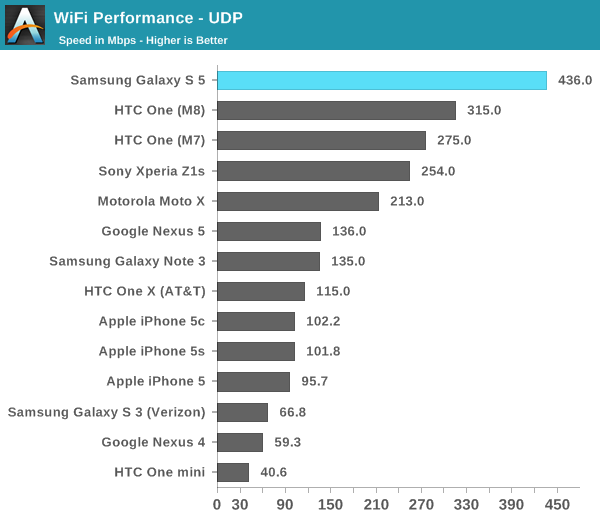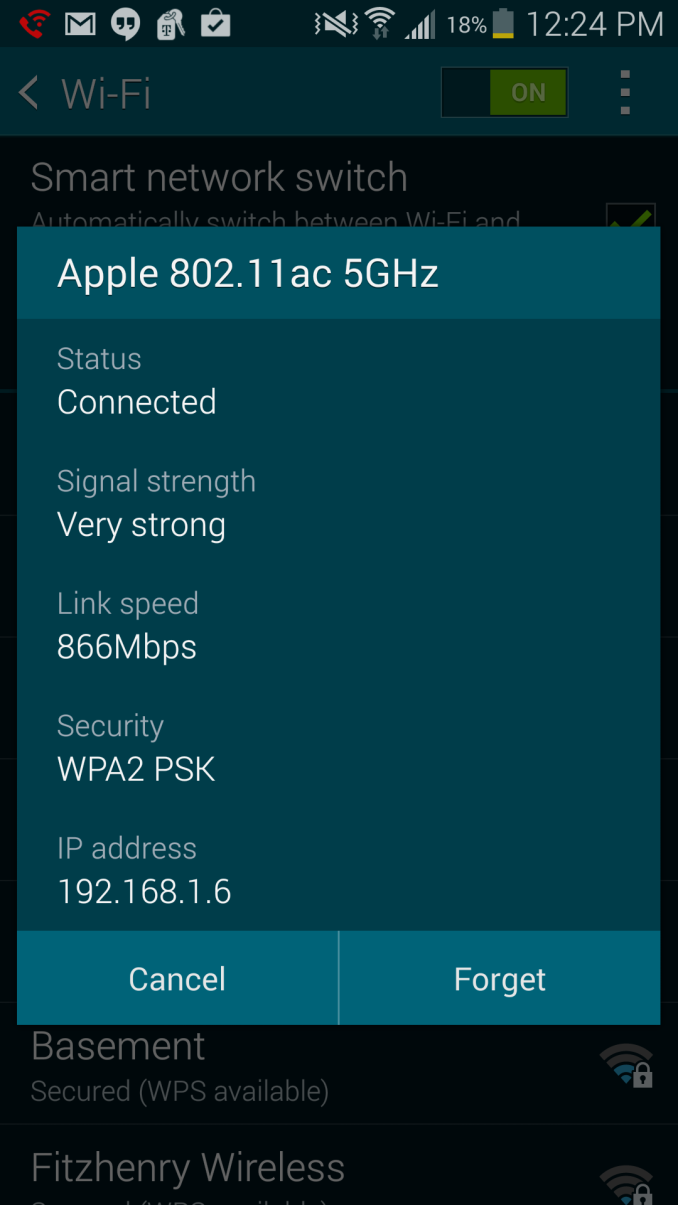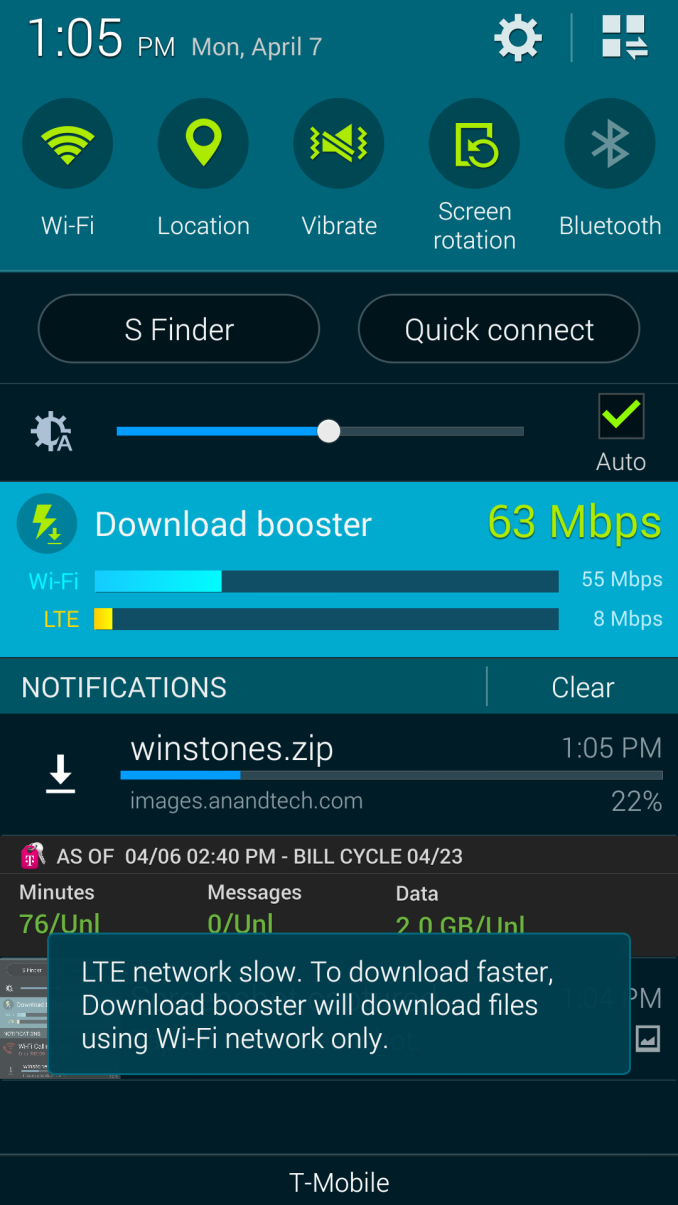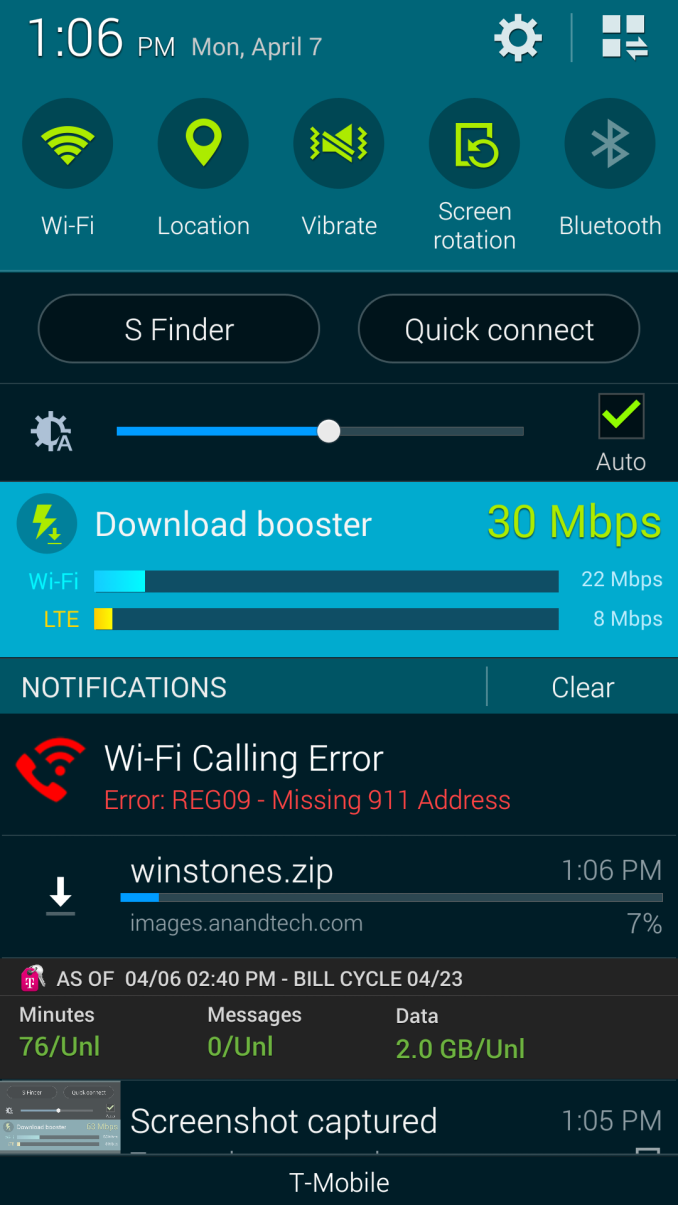Samsung Galaxy S 5 Review
by Anand Lal Shimpi & Joshua Ho on April 8, 2014 12:00 AM EST- Posted in
- Smartphones
- Samsung
- Mobile
- Galaxy S 5
WiFi, Cellular & Download Booster
At MWC this year Broadcom announced its BCM4354 802.11ac 2x2 MIMO WiFi combo chip for smartphones/tablets, which found its way into the GS5. The result is a smartphone capable of negotiating with an 802.11ac AP at 867Mbps, and transferring data at up to 436Mbps.
Although peak performance is nice, there are also power benefits to being able to transfer data quickly over WiFi (race to sleep applies to network interfaces as well).

The Snapdragon 801 features Qualcomm's integrated category 4 LTE 9x25 modem core. As I mentioned in our power analysis, Samsung also chose to include Qualcomm's QFE1100 envelope tracker (just like in the Galaxy Note 3). The GS5 is also the first flagship Samsung device to include support for 2 carrier aggregation on supported LTE networks. Samsung doesn't appear to be using Qualcomm's antenna tuner or any other RF360 components in the Galaxy S 5.
Seamless transition between network interfaces is one component of Qualcomm's vision of the future of connected devices. The problem is presently more of a software one than a hardware challenge. Samsung is beginning to explore software abstraction of underlying network interfaces with the GS5's software stack. There's now an option to prevent transitioning to WiFi networks that don't offer an improved network experience compared to your broadband connection. I haven't had a ton of time to test this feature out yet but it's something I plan on messing with more over the coming weeks.
The other big feature is what Samsung is calling Download booster. If enabled and under the right conditions, download booster allows you to combine WiFi and cellular network interfaces to accelerate large file downloads. All you have to do is enable download booster and you'll get a notification if it's active and working:
Download booster uses HTTP range requests to divide up files between the two network links. The feature can migrate data sessions from one link to another (WiFi to LTE, LTE to WiFi). Supported apps include the Play Store, YouTube, Facebook photo/video downloads, Samsung apps and standard HTTP web browsing (both Samsung's own browser and third party browsers). FTP and UDP aren't supported, nor is HTTPS.
There are other limitations as well. File downloads smaller than 30MB won't trigger download booster. Similarly, if one of the interfaces is substantially faster than the other download booster won't activate either. My home internet connection can regularly pull files down at 50 - 60Mbps, compared to < 10Mbps for T-Mobile LTE. When I was getting ~7Mbps over LTE and 50Mbps over WiFi, download booster automatically turned itself off. If I throttled my home network to 22Mbps however, download booster did its thing and gave me a healthy combined download speed of 30Mbps.
Download booster is a neat feature, although of limited use for those of us without truly unlimited high speed data plans. That being said, if you need to speed up a download in a pinch it's a great way to do that. I'm often at a press event wanting to download a benchmark onto a device as quickly as possible, usually without great WiFi or cellular reception - I can see download booster being very useful there at least.













296 Comments
View All Comments
xsoft7 - Tuesday, April 8, 2014 - link
just remove the touchwiz UI!every single samsung device has lags because of it!
after installing google edition\diffrent roms that not based on it, the lags dissappeard!
the UI is their most weak point, no matter how fast the cpu\gpu or ram will be, the ui, after several software insallation will L-A-G. just go over youtube and see it for yourself! wether it is GALAXY note 1,2,3 or galaxy s 12345, or tabs. they are lagging! (except google edition)
BedfordTim - Tuesday, April 8, 2014 - link
That is a deliberate feature put there so that you will upgrade to a "faster" phone.theduckofdeath - Tuesday, April 8, 2014 - link
The GS4 is the most stable phone of 2013. People who has actually held a phone know that people like you and xsoft7 are just trolling.http://www.androidcentral.com/apps-crashed-most-gi...
Give it up. No one cares about your opinion.
theduckofdeath - Tuesday, April 8, 2014 - link
*People who has actually held a GS4 know....Astarael - Tuesday, April 8, 2014 - link
*havenoel_newell - Friday, October 3, 2014 - link
In my opinion Galaxy S5 does not reach up to the same level as the competition, even from other Samsung phones (see http://www.consumertop.com/best-phone-guide/ ). For example HTC One M8 and Motorola Moto G are fantastic. But we can agree on one thing – Galaxy S5 wipes iPhone off the table any time of the day.earthrace57 - Tuesday, April 8, 2014 - link
I hate to break it to you, but how stable it is when using apps isn't exactly relevant when using touchwiz. On my friend's S4, there is noticeable slowing when doing motions in the basic UI, which is what we are talking about.theduckofdeath - Tuesday, April 8, 2014 - link
I hate to break it to you, every phone, no matter brand or OS can be slow if you install the wrong apps.Your "friends" phone is completely irrelevant to everybody who's actually used a GS4. Because we know you just full of it. How do I know I am more right than you? Because I know which Android phone is dominating sales. By a gigantic margin. If anything of what you're making up is true, Samsung wouldn't be as dominant, no matter how much money they would throw at their marketing department.
niva - Tuesday, April 8, 2014 - link
Dominating sales has nothing to do with what you're describing. Have you tried the google play version of the galaxy s? The one that comes with stock android and doesn't feature the silly overlays? Yup, runs more stable than the "regular" galaxy s and actually gets updated in terms of software.The reason why manufacturers drop those skins is not so they "look different" only but because they can somehow rationalize not updating the software on the device later and force you into an upgraded device sooner.
Anyone buying a non-nexus phone is in this boat unless they want to do some work on their own to keep the devices up to date and that doesn't always quite work out right in terms of stability.
darwinosx - Tuesday, April 8, 2014 - link
Even Nexus phones are not always updated immediately as we have seen in the last year.